Professional Portfolio: Developing Self & Others - CSE4034 Module
VerifiedAdded on 2022/09/15
|21
|4439
|14
Project
AI Summary
This professional portfolio, submitted for the Developing Self & Others module (CSE4034), chronicles a student's learning journey through five reflective blogs, each exploring a different module's key concepts. The portfolio utilizes Kolb's learning model to analyze experiences related to self-awareness, leadership theories, team dynamics, and stress management. The student reflects on Hollander’s model, Johari window, leadership styles (including transformational leadership), Belbin’s team roles, and the Ringelmann effect, drawing conclusions about their strengths and weaknesses. The portfolio also examines the impacts of leadership, self-efficacy, control, and stress management. Each blog integrates theory with personal experiences and planned future actions. A summary synthesizes the learning, and a learning contract is presented for future developments. The portfolio includes references and appendices with supporting materials. The student aims to apply these learnings to enhance their leadership and management abilities in professional settings, emphasizing the development of self-discipline, communication skills, and team management strategies.
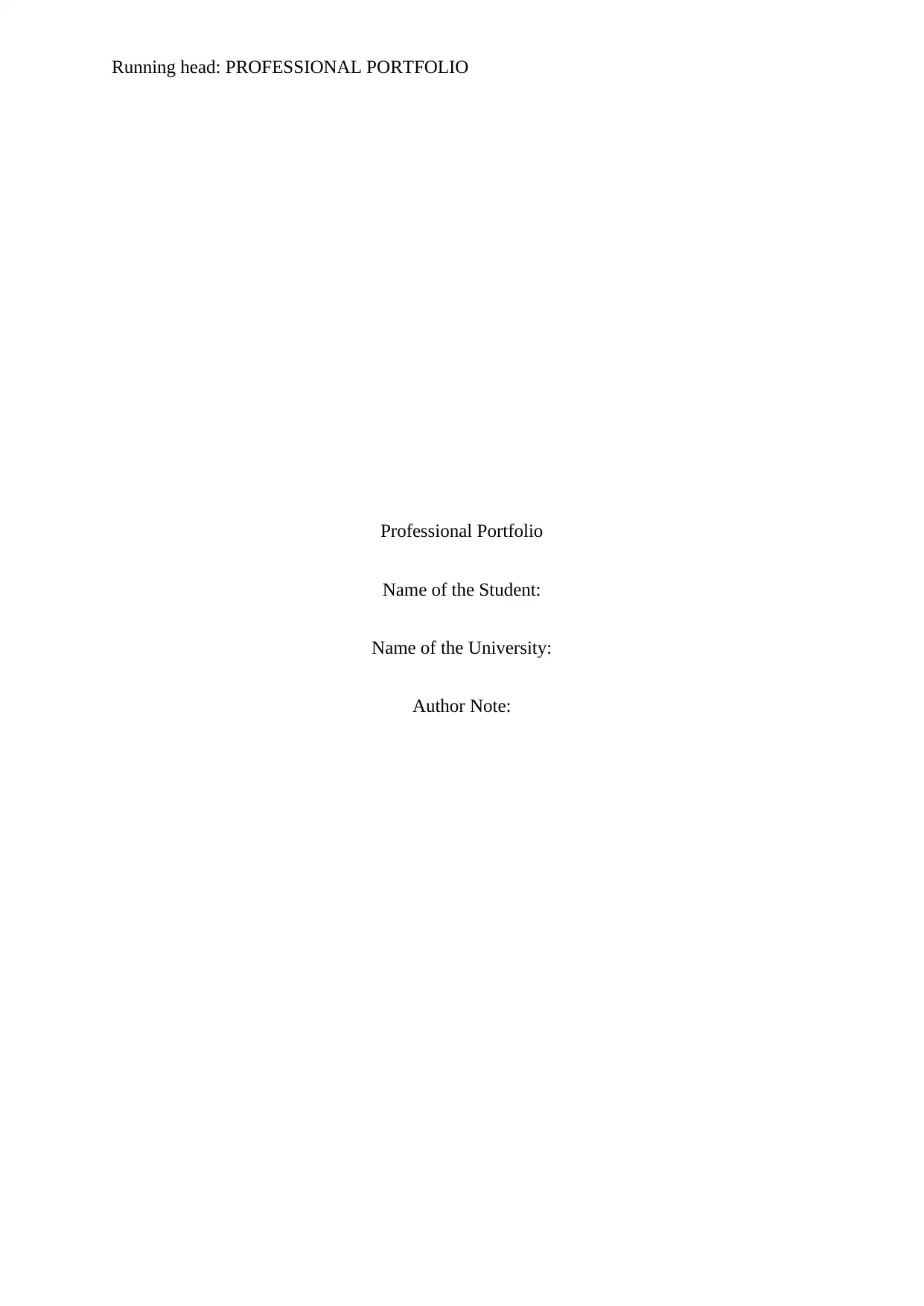
Running head: PROFESSIONAL PORTFOLIO
Professional Portfolio
Name of the Student:
Name of the University:
Author Note:
Professional Portfolio
Name of the Student:
Name of the University:
Author Note:
Paraphrase This Document
Need a fresh take? Get an instant paraphrase of this document with our AI Paraphraser
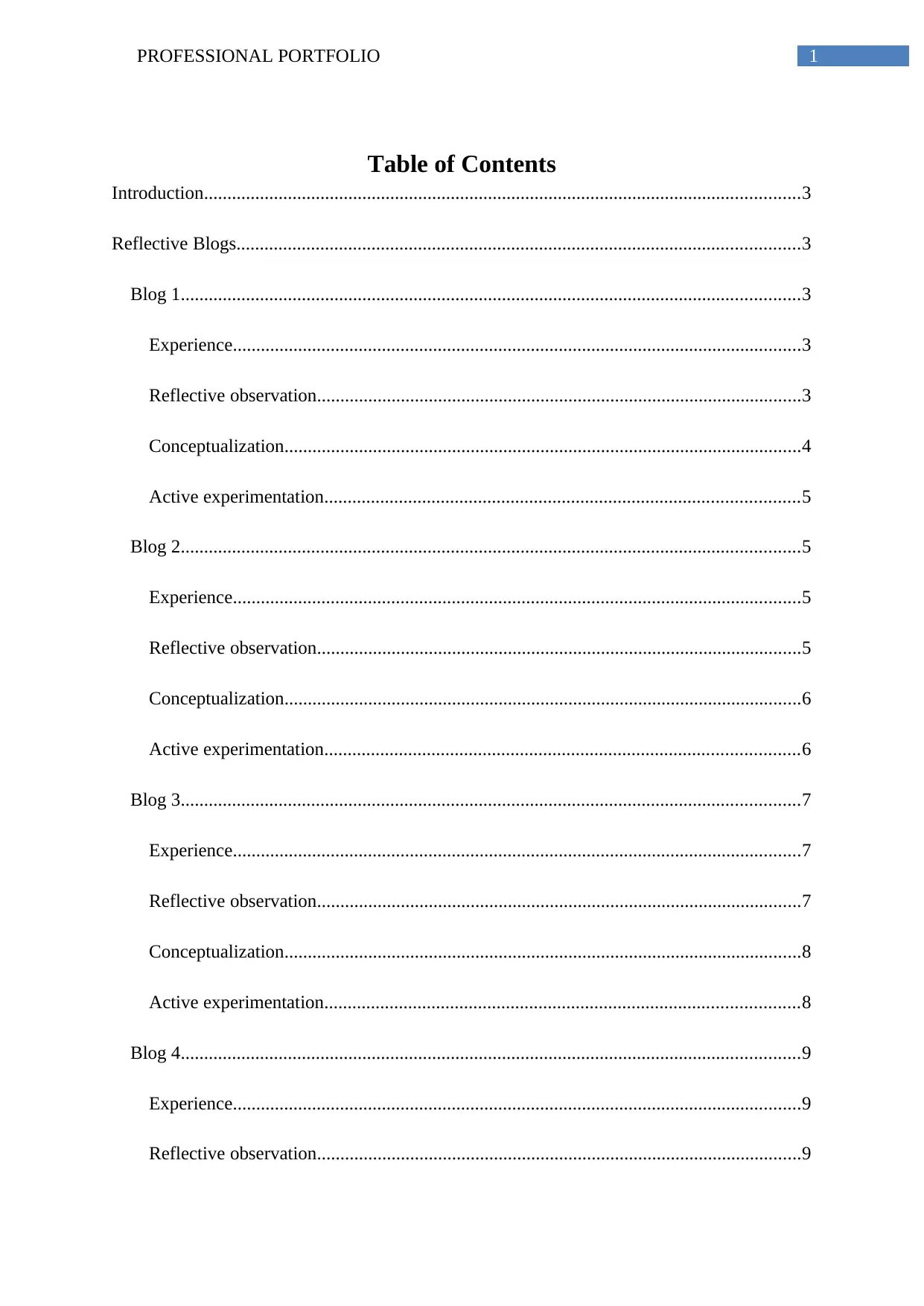
1PROFESSIONAL PORTFOLIO
Table of Contents
Introduction................................................................................................................................3
Reflective Blogs.........................................................................................................................3
Blog 1.....................................................................................................................................3
Experience..........................................................................................................................3
Reflective observation........................................................................................................3
Conceptualization...............................................................................................................4
Active experimentation......................................................................................................5
Blog 2.....................................................................................................................................5
Experience..........................................................................................................................5
Reflective observation........................................................................................................5
Conceptualization...............................................................................................................6
Active experimentation......................................................................................................6
Blog 3.....................................................................................................................................7
Experience..........................................................................................................................7
Reflective observation........................................................................................................7
Conceptualization...............................................................................................................8
Active experimentation......................................................................................................8
Blog 4.....................................................................................................................................9
Experience..........................................................................................................................9
Reflective observation........................................................................................................9
Table of Contents
Introduction................................................................................................................................3
Reflective Blogs.........................................................................................................................3
Blog 1.....................................................................................................................................3
Experience..........................................................................................................................3
Reflective observation........................................................................................................3
Conceptualization...............................................................................................................4
Active experimentation......................................................................................................5
Blog 2.....................................................................................................................................5
Experience..........................................................................................................................5
Reflective observation........................................................................................................5
Conceptualization...............................................................................................................6
Active experimentation......................................................................................................6
Blog 3.....................................................................................................................................7
Experience..........................................................................................................................7
Reflective observation........................................................................................................7
Conceptualization...............................................................................................................8
Active experimentation......................................................................................................8
Blog 4.....................................................................................................................................9
Experience..........................................................................................................................9
Reflective observation........................................................................................................9
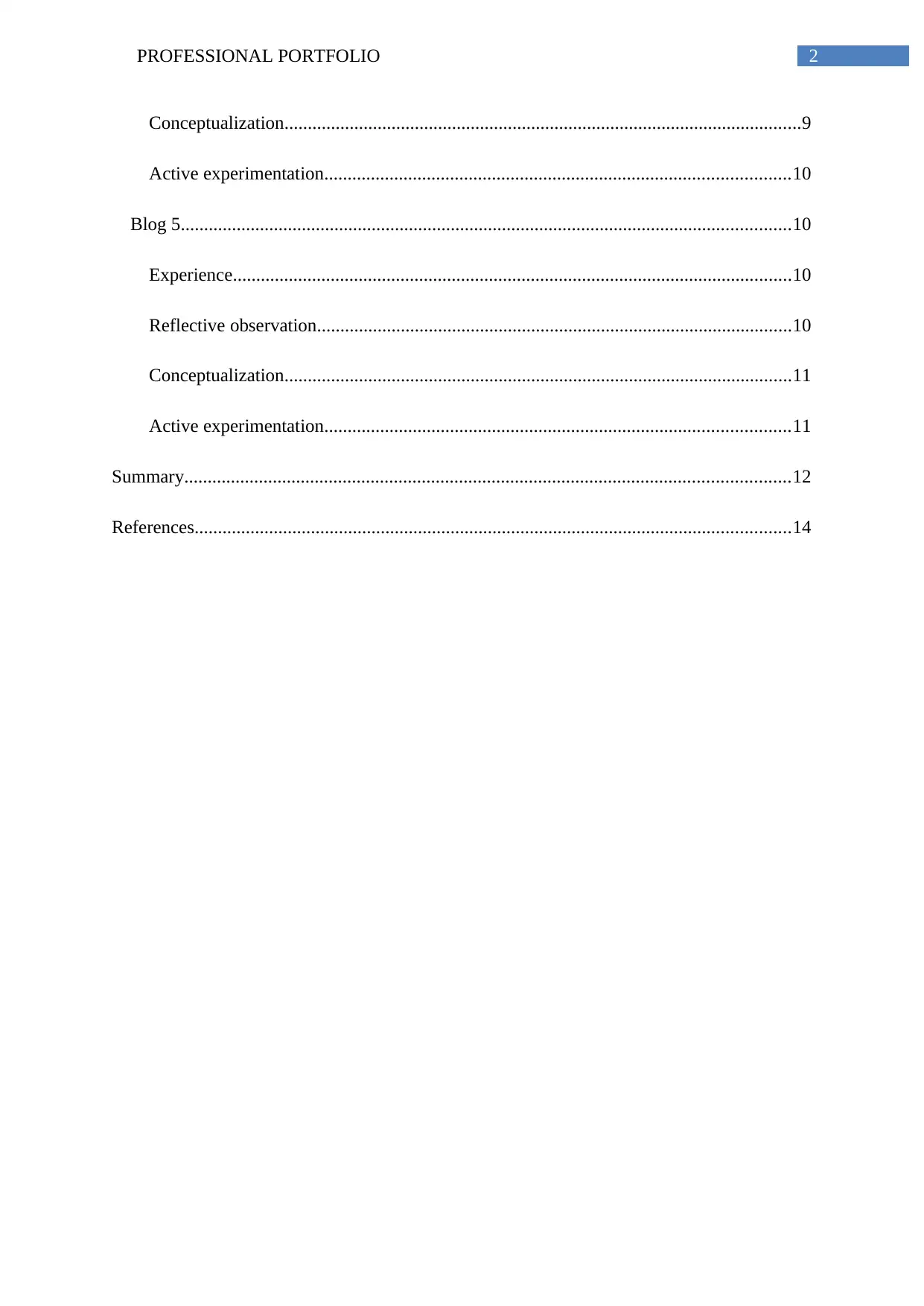
2PROFESSIONAL PORTFOLIO
Conceptualization...............................................................................................................9
Active experimentation....................................................................................................10
Blog 5...................................................................................................................................10
Experience........................................................................................................................10
Reflective observation......................................................................................................10
Conceptualization.............................................................................................................11
Active experimentation....................................................................................................11
Summary..................................................................................................................................12
References................................................................................................................................14
Conceptualization...............................................................................................................9
Active experimentation....................................................................................................10
Blog 5...................................................................................................................................10
Experience........................................................................................................................10
Reflective observation......................................................................................................10
Conceptualization.............................................................................................................11
Active experimentation....................................................................................................11
Summary..................................................................................................................................12
References................................................................................................................................14
⊘ This is a preview!⊘
Do you want full access?
Subscribe today to unlock all pages.

Trusted by 1+ million students worldwide
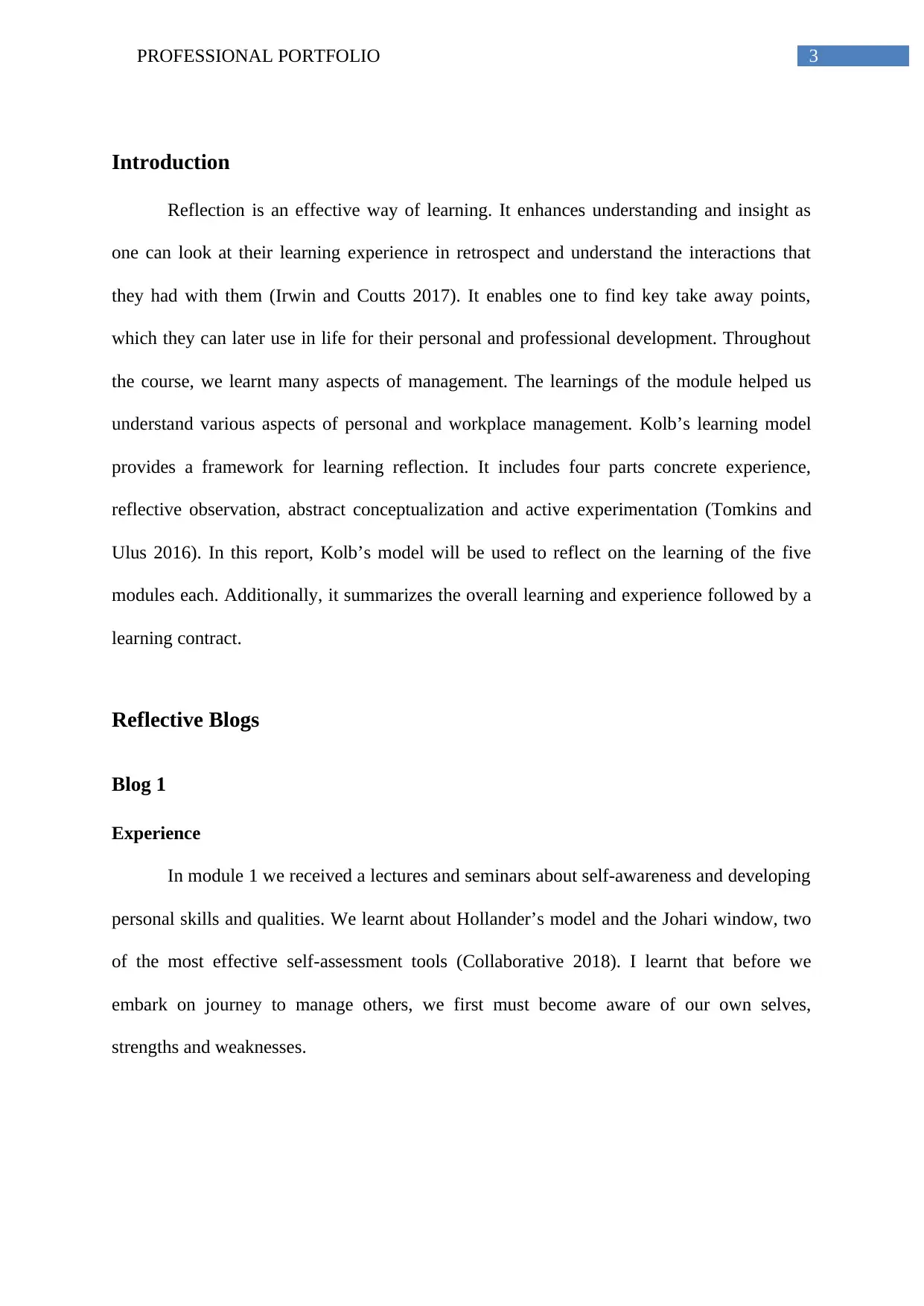
3PROFESSIONAL PORTFOLIO
Introduction
Reflection is an effective way of learning. It enhances understanding and insight as
one can look at their learning experience in retrospect and understand the interactions that
they had with them (Irwin and Coutts 2017). It enables one to find key take away points,
which they can later use in life for their personal and professional development. Throughout
the course, we learnt many aspects of management. The learnings of the module helped us
understand various aspects of personal and workplace management. Kolb’s learning model
provides a framework for learning reflection. It includes four parts concrete experience,
reflective observation, abstract conceptualization and active experimentation (Tomkins and
Ulus 2016). In this report, Kolb’s model will be used to reflect on the learning of the five
modules each. Additionally, it summarizes the overall learning and experience followed by a
learning contract.
Reflective Blogs
Blog 1
Experience
In module 1 we received a lectures and seminars about self-awareness and developing
personal skills and qualities. We learnt about Hollander’s model and the Johari window, two
of the most effective self-assessment tools (Collaborative 2018). I learnt that before we
embark on journey to manage others, we first must become aware of our own selves,
strengths and weaknesses.
Introduction
Reflection is an effective way of learning. It enhances understanding and insight as
one can look at their learning experience in retrospect and understand the interactions that
they had with them (Irwin and Coutts 2017). It enables one to find key take away points,
which they can later use in life for their personal and professional development. Throughout
the course, we learnt many aspects of management. The learnings of the module helped us
understand various aspects of personal and workplace management. Kolb’s learning model
provides a framework for learning reflection. It includes four parts concrete experience,
reflective observation, abstract conceptualization and active experimentation (Tomkins and
Ulus 2016). In this report, Kolb’s model will be used to reflect on the learning of the five
modules each. Additionally, it summarizes the overall learning and experience followed by a
learning contract.
Reflective Blogs
Blog 1
Experience
In module 1 we received a lectures and seminars about self-awareness and developing
personal skills and qualities. We learnt about Hollander’s model and the Johari window, two
of the most effective self-assessment tools (Collaborative 2018). I learnt that before we
embark on journey to manage others, we first must become aware of our own selves,
strengths and weaknesses.
Paraphrase This Document
Need a fresh take? Get an instant paraphrase of this document with our AI Paraphraser
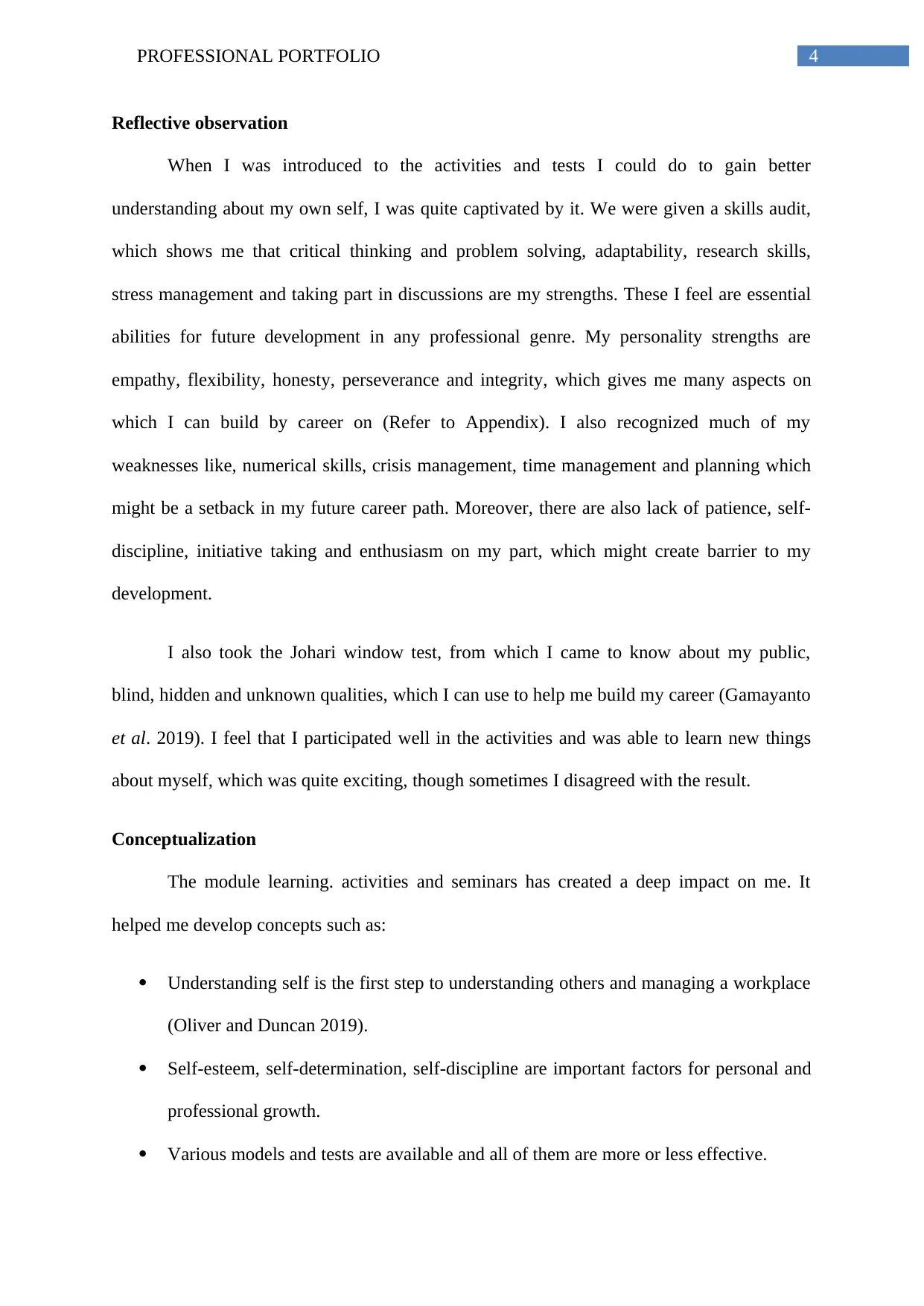
4PROFESSIONAL PORTFOLIO
Reflective observation
When I was introduced to the activities and tests I could do to gain better
understanding about my own self, I was quite captivated by it. We were given a skills audit,
which shows me that critical thinking and problem solving, adaptability, research skills,
stress management and taking part in discussions are my strengths. These I feel are essential
abilities for future development in any professional genre. My personality strengths are
empathy, flexibility, honesty, perseverance and integrity, which gives me many aspects on
which I can build by career on (Refer to Appendix). I also recognized much of my
weaknesses like, numerical skills, crisis management, time management and planning which
might be a setback in my future career path. Moreover, there are also lack of patience, self-
discipline, initiative taking and enthusiasm on my part, which might create barrier to my
development.
I also took the Johari window test, from which I came to know about my public,
blind, hidden and unknown qualities, which I can use to help me build my career (Gamayanto
et al. 2019). I feel that I participated well in the activities and was able to learn new things
about myself, which was quite exciting, though sometimes I disagreed with the result.
Conceptualization
The module learning. activities and seminars has created a deep impact on me. It
helped me develop concepts such as:
Understanding self is the first step to understanding others and managing a workplace
(Oliver and Duncan 2019).
Self-esteem, self-determination, self-discipline are important factors for personal and
professional growth.
Various models and tests are available and all of them are more or less effective.
Reflective observation
When I was introduced to the activities and tests I could do to gain better
understanding about my own self, I was quite captivated by it. We were given a skills audit,
which shows me that critical thinking and problem solving, adaptability, research skills,
stress management and taking part in discussions are my strengths. These I feel are essential
abilities for future development in any professional genre. My personality strengths are
empathy, flexibility, honesty, perseverance and integrity, which gives me many aspects on
which I can build by career on (Refer to Appendix). I also recognized much of my
weaknesses like, numerical skills, crisis management, time management and planning which
might be a setback in my future career path. Moreover, there are also lack of patience, self-
discipline, initiative taking and enthusiasm on my part, which might create barrier to my
development.
I also took the Johari window test, from which I came to know about my public,
blind, hidden and unknown qualities, which I can use to help me build my career (Gamayanto
et al. 2019). I feel that I participated well in the activities and was able to learn new things
about myself, which was quite exciting, though sometimes I disagreed with the result.
Conceptualization
The module learning. activities and seminars has created a deep impact on me. It
helped me develop concepts such as:
Understanding self is the first step to understanding others and managing a workplace
(Oliver and Duncan 2019).
Self-esteem, self-determination, self-discipline are important factors for personal and
professional growth.
Various models and tests are available and all of them are more or less effective.
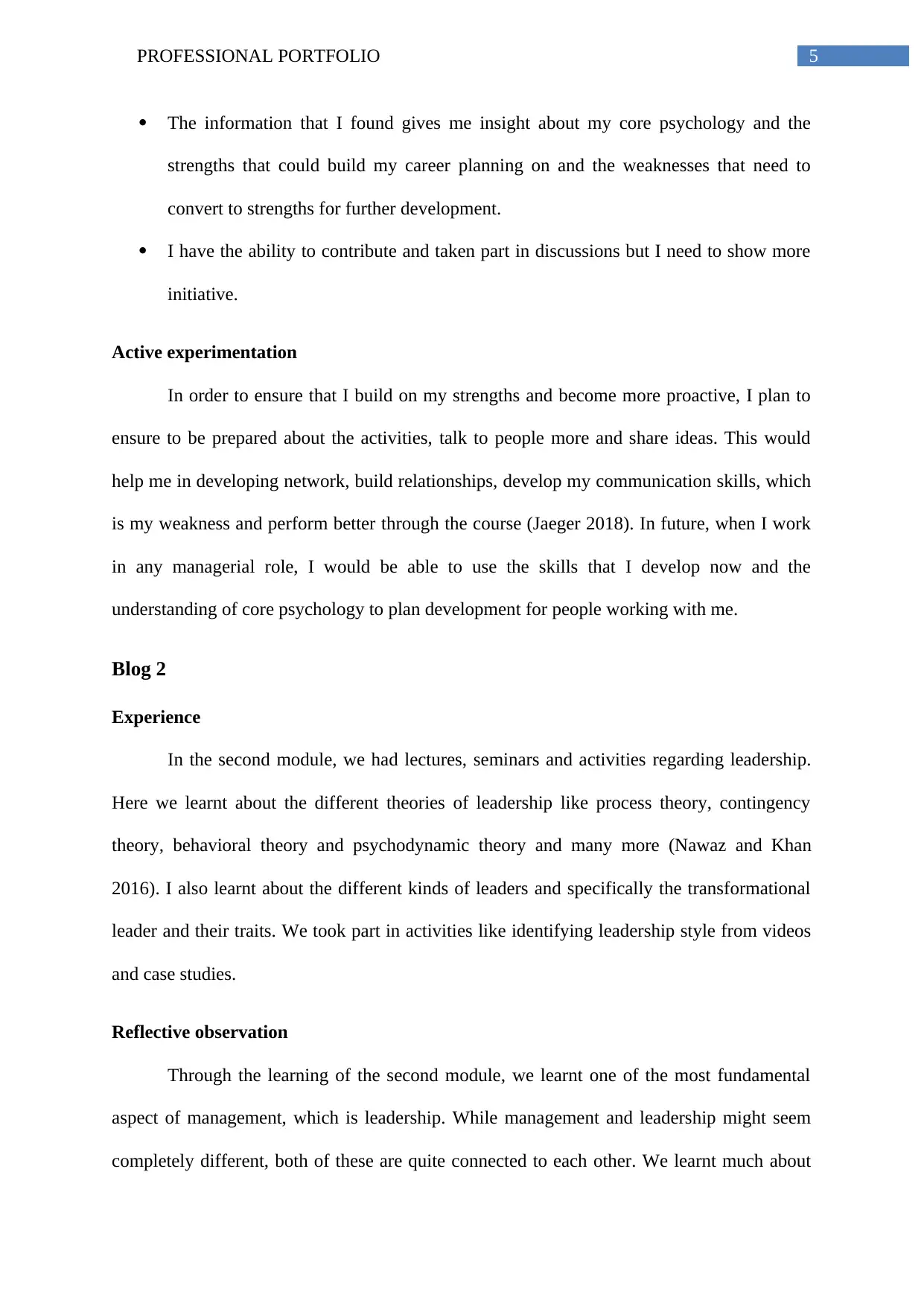
5PROFESSIONAL PORTFOLIO
The information that I found gives me insight about my core psychology and the
strengths that could build my career planning on and the weaknesses that need to
convert to strengths for further development.
I have the ability to contribute and taken part in discussions but I need to show more
initiative.
Active experimentation
In order to ensure that I build on my strengths and become more proactive, I plan to
ensure to be prepared about the activities, talk to people more and share ideas. This would
help me in developing network, build relationships, develop my communication skills, which
is my weakness and perform better through the course (Jaeger 2018). In future, when I work
in any managerial role, I would be able to use the skills that I develop now and the
understanding of core psychology to plan development for people working with me.
Blog 2
Experience
In the second module, we had lectures, seminars and activities regarding leadership.
Here we learnt about the different theories of leadership like process theory, contingency
theory, behavioral theory and psychodynamic theory and many more (Nawaz and Khan
2016). I also learnt about the different kinds of leaders and specifically the transformational
leader and their traits. We took part in activities like identifying leadership style from videos
and case studies.
Reflective observation
Through the learning of the second module, we learnt one of the most fundamental
aspect of management, which is leadership. While management and leadership might seem
completely different, both of these are quite connected to each other. We learnt much about
The information that I found gives me insight about my core psychology and the
strengths that could build my career planning on and the weaknesses that need to
convert to strengths for further development.
I have the ability to contribute and taken part in discussions but I need to show more
initiative.
Active experimentation
In order to ensure that I build on my strengths and become more proactive, I plan to
ensure to be prepared about the activities, talk to people more and share ideas. This would
help me in developing network, build relationships, develop my communication skills, which
is my weakness and perform better through the course (Jaeger 2018). In future, when I work
in any managerial role, I would be able to use the skills that I develop now and the
understanding of core psychology to plan development for people working with me.
Blog 2
Experience
In the second module, we had lectures, seminars and activities regarding leadership.
Here we learnt about the different theories of leadership like process theory, contingency
theory, behavioral theory and psychodynamic theory and many more (Nawaz and Khan
2016). I also learnt about the different kinds of leaders and specifically the transformational
leader and their traits. We took part in activities like identifying leadership style from videos
and case studies.
Reflective observation
Through the learning of the second module, we learnt one of the most fundamental
aspect of management, which is leadership. While management and leadership might seem
completely different, both of these are quite connected to each other. We learnt much about
⊘ This is a preview!⊘
Do you want full access?
Subscribe today to unlock all pages.

Trusted by 1+ million students worldwide
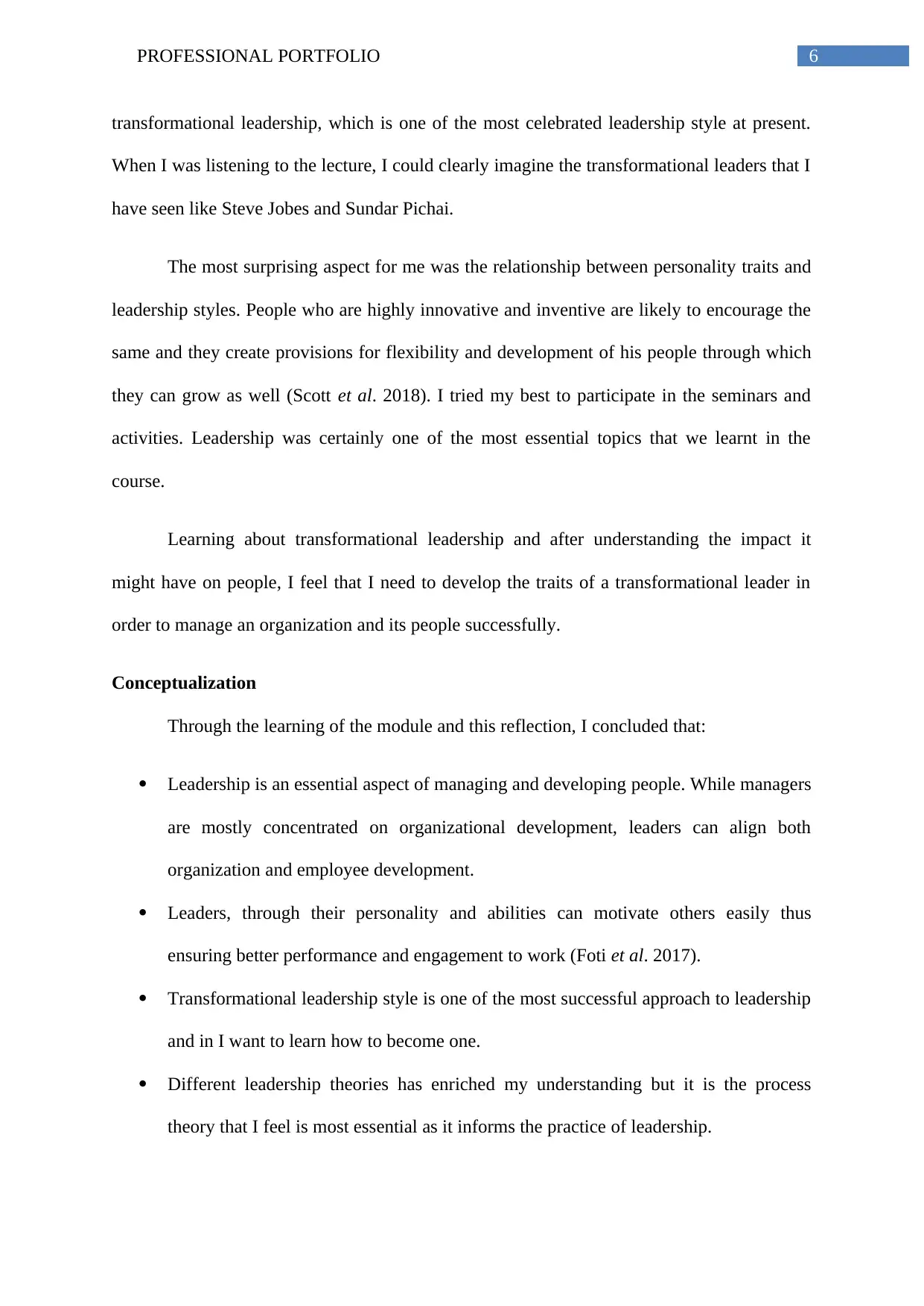
6PROFESSIONAL PORTFOLIO
transformational leadership, which is one of the most celebrated leadership style at present.
When I was listening to the lecture, I could clearly imagine the transformational leaders that I
have seen like Steve Jobes and Sundar Pichai.
The most surprising aspect for me was the relationship between personality traits and
leadership styles. People who are highly innovative and inventive are likely to encourage the
same and they create provisions for flexibility and development of his people through which
they can grow as well (Scott et al. 2018). I tried my best to participate in the seminars and
activities. Leadership was certainly one of the most essential topics that we learnt in the
course.
Learning about transformational leadership and after understanding the impact it
might have on people, I feel that I need to develop the traits of a transformational leader in
order to manage an organization and its people successfully.
Conceptualization
Through the learning of the module and this reflection, I concluded that:
Leadership is an essential aspect of managing and developing people. While managers
are mostly concentrated on organizational development, leaders can align both
organization and employee development.
Leaders, through their personality and abilities can motivate others easily thus
ensuring better performance and engagement to work (Foti et al. 2017).
Transformational leadership style is one of the most successful approach to leadership
and in I want to learn how to become one.
Different leadership theories has enriched my understanding but it is the process
theory that I feel is most essential as it informs the practice of leadership.
transformational leadership, which is one of the most celebrated leadership style at present.
When I was listening to the lecture, I could clearly imagine the transformational leaders that I
have seen like Steve Jobes and Sundar Pichai.
The most surprising aspect for me was the relationship between personality traits and
leadership styles. People who are highly innovative and inventive are likely to encourage the
same and they create provisions for flexibility and development of his people through which
they can grow as well (Scott et al. 2018). I tried my best to participate in the seminars and
activities. Leadership was certainly one of the most essential topics that we learnt in the
course.
Learning about transformational leadership and after understanding the impact it
might have on people, I feel that I need to develop the traits of a transformational leader in
order to manage an organization and its people successfully.
Conceptualization
Through the learning of the module and this reflection, I concluded that:
Leadership is an essential aspect of managing and developing people. While managers
are mostly concentrated on organizational development, leaders can align both
organization and employee development.
Leaders, through their personality and abilities can motivate others easily thus
ensuring better performance and engagement to work (Foti et al. 2017).
Transformational leadership style is one of the most successful approach to leadership
and in I want to learn how to become one.
Different leadership theories has enriched my understanding but it is the process
theory that I feel is most essential as it informs the practice of leadership.
Paraphrase This Document
Need a fresh take? Get an instant paraphrase of this document with our AI Paraphraser
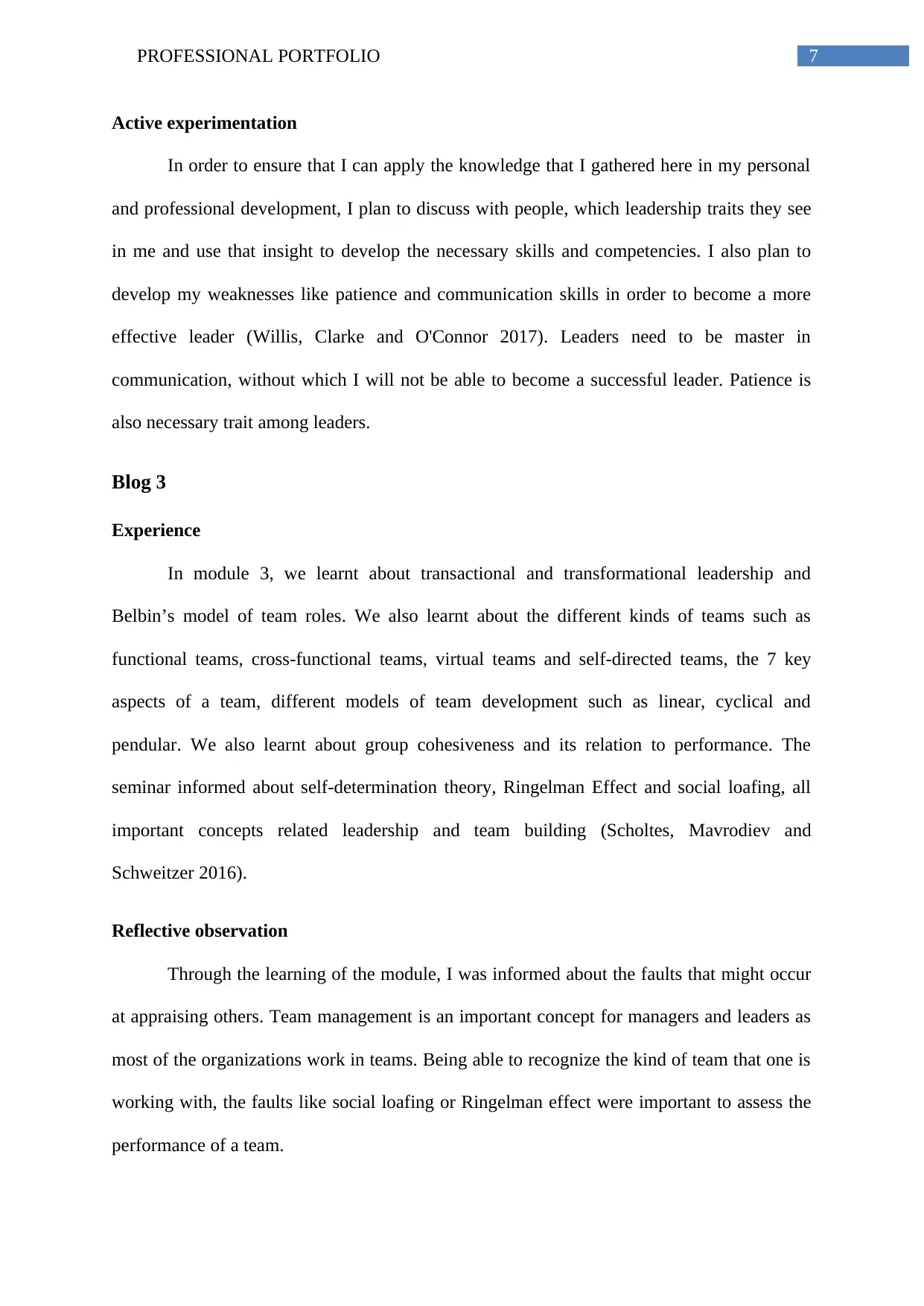
7PROFESSIONAL PORTFOLIO
Active experimentation
In order to ensure that I can apply the knowledge that I gathered here in my personal
and professional development, I plan to discuss with people, which leadership traits they see
in me and use that insight to develop the necessary skills and competencies. I also plan to
develop my weaknesses like patience and communication skills in order to become a more
effective leader (Willis, Clarke and O'Connor 2017). Leaders need to be master in
communication, without which I will not be able to become a successful leader. Patience is
also necessary trait among leaders.
Blog 3
Experience
In module 3, we learnt about transactional and transformational leadership and
Belbin’s model of team roles. We also learnt about the different kinds of teams such as
functional teams, cross-functional teams, virtual teams and self-directed teams, the 7 key
aspects of a team, different models of team development such as linear, cyclical and
pendular. We also learnt about group cohesiveness and its relation to performance. The
seminar informed about self-determination theory, Ringelman Effect and social loafing, all
important concepts related leadership and team building (Scholtes, Mavrodiev and
Schweitzer 2016).
Reflective observation
Through the learning of the module, I was informed about the faults that might occur
at appraising others. Team management is an important concept for managers and leaders as
most of the organizations work in teams. Being able to recognize the kind of team that one is
working with, the faults like social loafing or Ringelman effect were important to assess the
performance of a team.
Active experimentation
In order to ensure that I can apply the knowledge that I gathered here in my personal
and professional development, I plan to discuss with people, which leadership traits they see
in me and use that insight to develop the necessary skills and competencies. I also plan to
develop my weaknesses like patience and communication skills in order to become a more
effective leader (Willis, Clarke and O'Connor 2017). Leaders need to be master in
communication, without which I will not be able to become a successful leader. Patience is
also necessary trait among leaders.
Blog 3
Experience
In module 3, we learnt about transactional and transformational leadership and
Belbin’s model of team roles. We also learnt about the different kinds of teams such as
functional teams, cross-functional teams, virtual teams and self-directed teams, the 7 key
aspects of a team, different models of team development such as linear, cyclical and
pendular. We also learnt about group cohesiveness and its relation to performance. The
seminar informed about self-determination theory, Ringelman Effect and social loafing, all
important concepts related leadership and team building (Scholtes, Mavrodiev and
Schweitzer 2016).
Reflective observation
Through the learning of the module, I was informed about the faults that might occur
at appraising others. Team management is an important concept for managers and leaders as
most of the organizations work in teams. Being able to recognize the kind of team that one is
working with, the faults like social loafing or Ringelman effect were important to assess the
performance of a team.
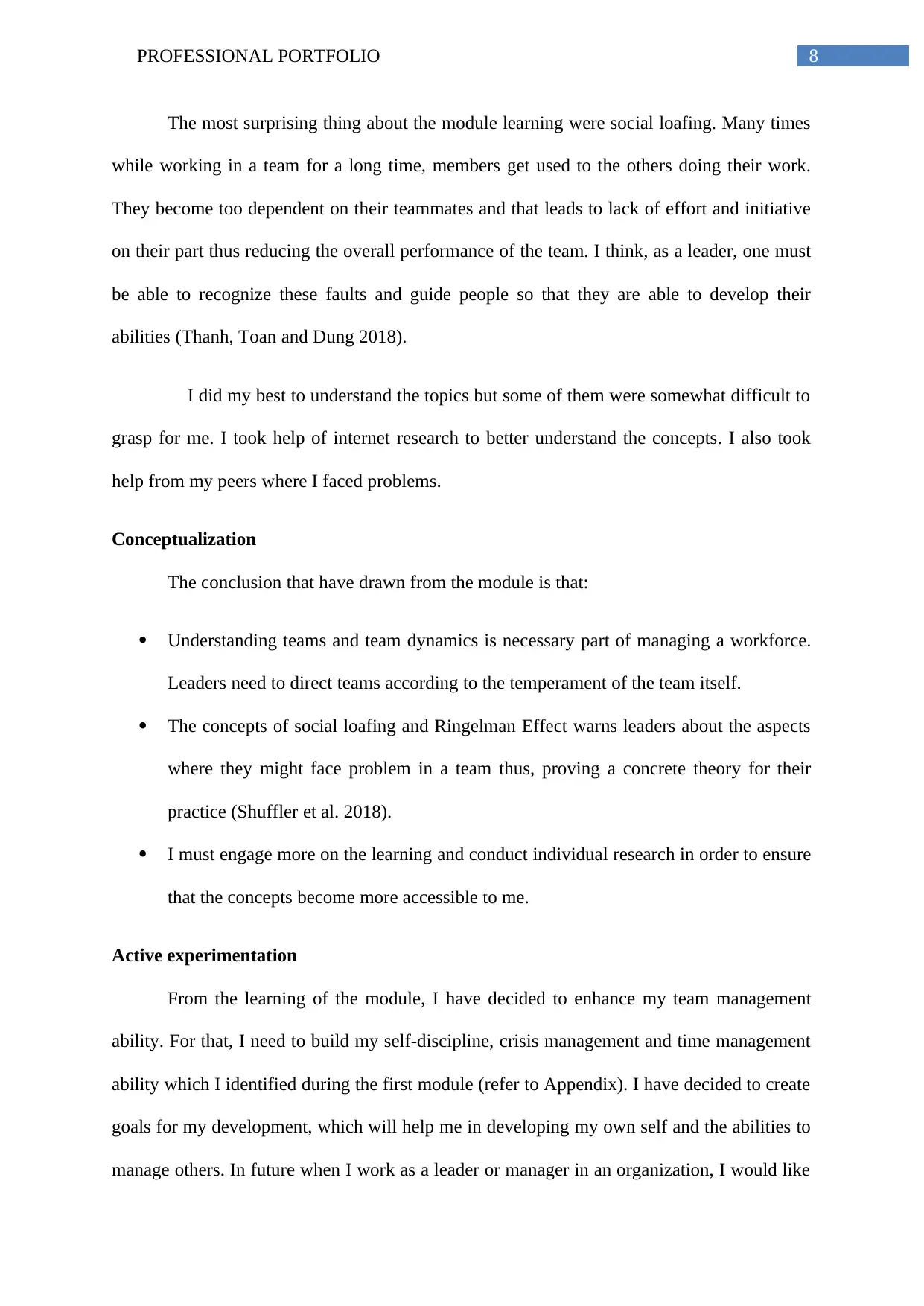
8PROFESSIONAL PORTFOLIO
The most surprising thing about the module learning were social loafing. Many times
while working in a team for a long time, members get used to the others doing their work.
They become too dependent on their teammates and that leads to lack of effort and initiative
on their part thus reducing the overall performance of the team. I think, as a leader, one must
be able to recognize these faults and guide people so that they are able to develop their
abilities (Thanh, Toan and Dung 2018).
I did my best to understand the topics but some of them were somewhat difficult to
grasp for me. I took help of internet research to better understand the concepts. I also took
help from my peers where I faced problems.
Conceptualization
The conclusion that have drawn from the module is that:
Understanding teams and team dynamics is necessary part of managing a workforce.
Leaders need to direct teams according to the temperament of the team itself.
The concepts of social loafing and Ringelman Effect warns leaders about the aspects
where they might face problem in a team thus, proving a concrete theory for their
practice (Shuffler et al. 2018).
I must engage more on the learning and conduct individual research in order to ensure
that the concepts become more accessible to me.
Active experimentation
From the learning of the module, I have decided to enhance my team management
ability. For that, I need to build my self-discipline, crisis management and time management
ability which I identified during the first module (refer to Appendix). I have decided to create
goals for my development, which will help me in developing my own self and the abilities to
manage others. In future when I work as a leader or manager in an organization, I would like
The most surprising thing about the module learning were social loafing. Many times
while working in a team for a long time, members get used to the others doing their work.
They become too dependent on their teammates and that leads to lack of effort and initiative
on their part thus reducing the overall performance of the team. I think, as a leader, one must
be able to recognize these faults and guide people so that they are able to develop their
abilities (Thanh, Toan and Dung 2018).
I did my best to understand the topics but some of them were somewhat difficult to
grasp for me. I took help of internet research to better understand the concepts. I also took
help from my peers where I faced problems.
Conceptualization
The conclusion that have drawn from the module is that:
Understanding teams and team dynamics is necessary part of managing a workforce.
Leaders need to direct teams according to the temperament of the team itself.
The concepts of social loafing and Ringelman Effect warns leaders about the aspects
where they might face problem in a team thus, proving a concrete theory for their
practice (Shuffler et al. 2018).
I must engage more on the learning and conduct individual research in order to ensure
that the concepts become more accessible to me.
Active experimentation
From the learning of the module, I have decided to enhance my team management
ability. For that, I need to build my self-discipline, crisis management and time management
ability which I identified during the first module (refer to Appendix). I have decided to create
goals for my development, which will help me in developing my own self and the abilities to
manage others. In future when I work as a leader or manager in an organization, I would like
⊘ This is a preview!⊘
Do you want full access?
Subscribe today to unlock all pages.

Trusted by 1+ million students worldwide
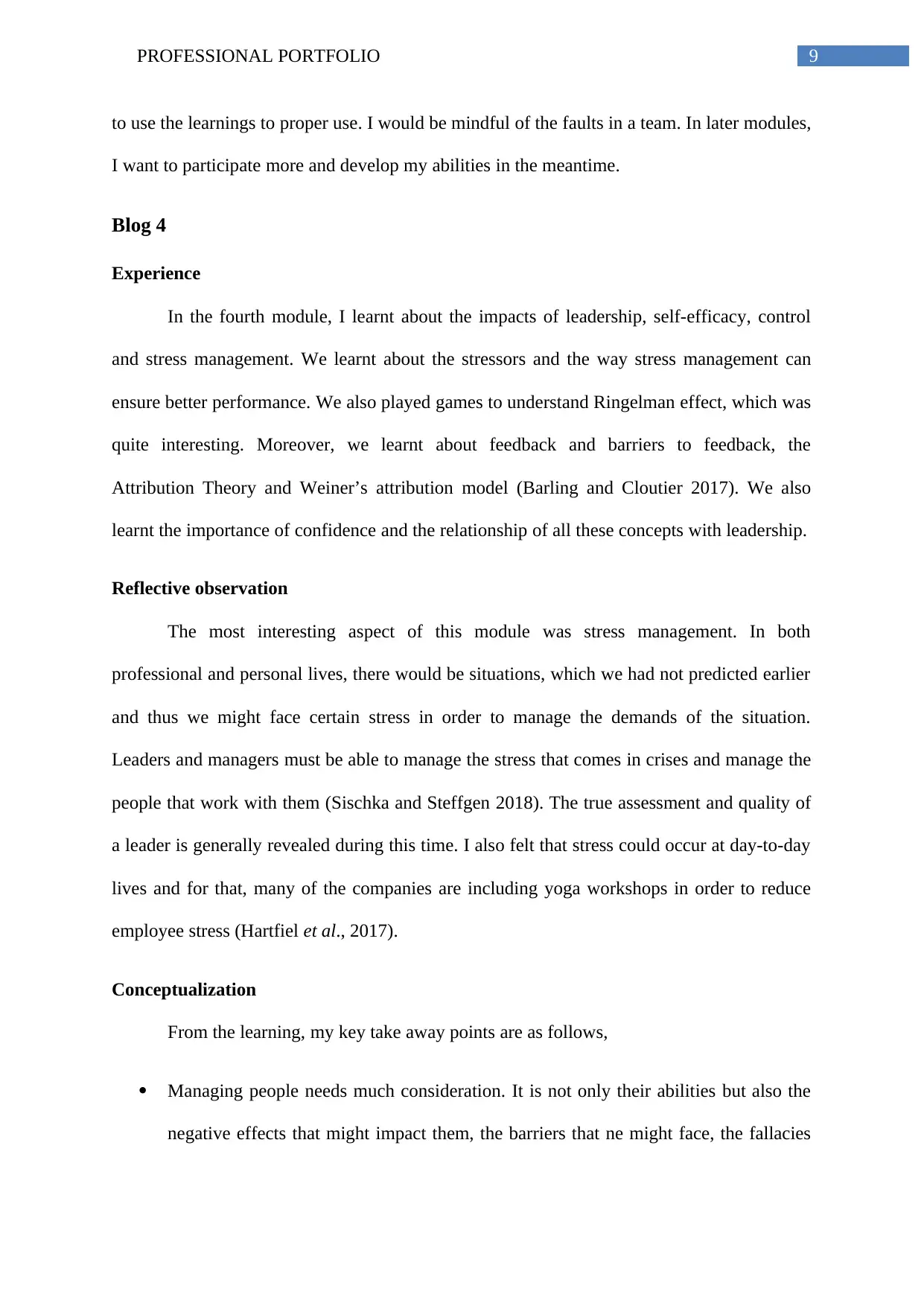
9PROFESSIONAL PORTFOLIO
to use the learnings to proper use. I would be mindful of the faults in a team. In later modules,
I want to participate more and develop my abilities in the meantime.
Blog 4
Experience
In the fourth module, I learnt about the impacts of leadership, self-efficacy, control
and stress management. We learnt about the stressors and the way stress management can
ensure better performance. We also played games to understand Ringelman effect, which was
quite interesting. Moreover, we learnt about feedback and barriers to feedback, the
Attribution Theory and Weiner’s attribution model (Barling and Cloutier 2017). We also
learnt the importance of confidence and the relationship of all these concepts with leadership.
Reflective observation
The most interesting aspect of this module was stress management. In both
professional and personal lives, there would be situations, which we had not predicted earlier
and thus we might face certain stress in order to manage the demands of the situation.
Leaders and managers must be able to manage the stress that comes in crises and manage the
people that work with them (Sischka and Steffgen 2018). The true assessment and quality of
a leader is generally revealed during this time. I also felt that stress could occur at day-to-day
lives and for that, many of the companies are including yoga workshops in order to reduce
employee stress (Hartfiel et al., 2017).
Conceptualization
From the learning, my key take away points are as follows,
Managing people needs much consideration. It is not only their abilities but also the
negative effects that might impact them, the barriers that ne might face, the fallacies
to use the learnings to proper use. I would be mindful of the faults in a team. In later modules,
I want to participate more and develop my abilities in the meantime.
Blog 4
Experience
In the fourth module, I learnt about the impacts of leadership, self-efficacy, control
and stress management. We learnt about the stressors and the way stress management can
ensure better performance. We also played games to understand Ringelman effect, which was
quite interesting. Moreover, we learnt about feedback and barriers to feedback, the
Attribution Theory and Weiner’s attribution model (Barling and Cloutier 2017). We also
learnt the importance of confidence and the relationship of all these concepts with leadership.
Reflective observation
The most interesting aspect of this module was stress management. In both
professional and personal lives, there would be situations, which we had not predicted earlier
and thus we might face certain stress in order to manage the demands of the situation.
Leaders and managers must be able to manage the stress that comes in crises and manage the
people that work with them (Sischka and Steffgen 2018). The true assessment and quality of
a leader is generally revealed during this time. I also felt that stress could occur at day-to-day
lives and for that, many of the companies are including yoga workshops in order to reduce
employee stress (Hartfiel et al., 2017).
Conceptualization
From the learning, my key take away points are as follows,
Managing people needs much consideration. It is not only their abilities but also the
negative effects that might impact them, the barriers that ne might face, the fallacies
Paraphrase This Document
Need a fresh take? Get an instant paraphrase of this document with our AI Paraphraser
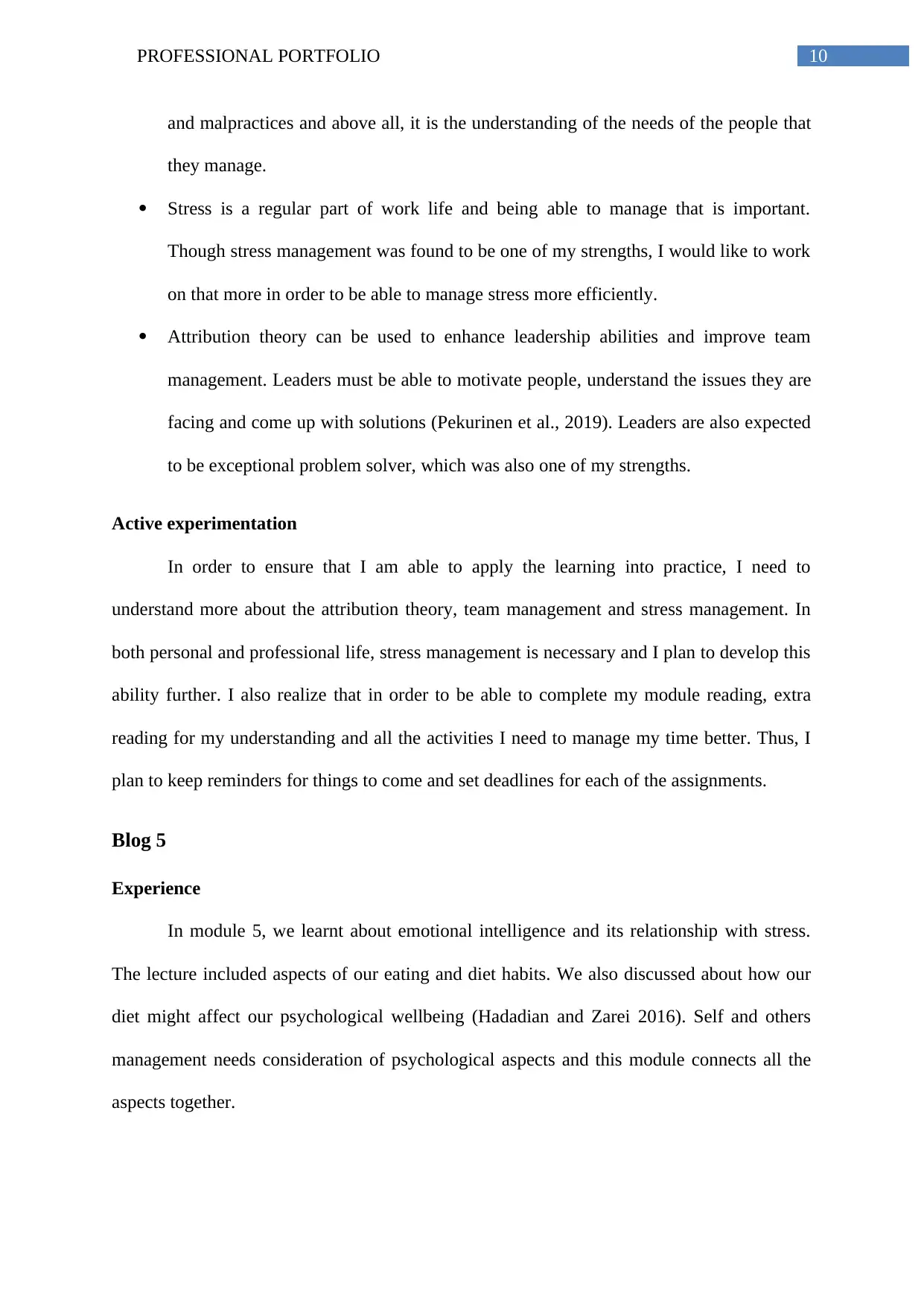
10PROFESSIONAL PORTFOLIO
and malpractices and above all, it is the understanding of the needs of the people that
they manage.
Stress is a regular part of work life and being able to manage that is important.
Though stress management was found to be one of my strengths, I would like to work
on that more in order to be able to manage stress more efficiently.
Attribution theory can be used to enhance leadership abilities and improve team
management. Leaders must be able to motivate people, understand the issues they are
facing and come up with solutions (Pekurinen et al., 2019). Leaders are also expected
to be exceptional problem solver, which was also one of my strengths.
Active experimentation
In order to ensure that I am able to apply the learning into practice, I need to
understand more about the attribution theory, team management and stress management. In
both personal and professional life, stress management is necessary and I plan to develop this
ability further. I also realize that in order to be able to complete my module reading, extra
reading for my understanding and all the activities I need to manage my time better. Thus, I
plan to keep reminders for things to come and set deadlines for each of the assignments.
Blog 5
Experience
In module 5, we learnt about emotional intelligence and its relationship with stress.
The lecture included aspects of our eating and diet habits. We also discussed about how our
diet might affect our psychological wellbeing (Hadadian and Zarei 2016). Self and others
management needs consideration of psychological aspects and this module connects all the
aspects together.
and malpractices and above all, it is the understanding of the needs of the people that
they manage.
Stress is a regular part of work life and being able to manage that is important.
Though stress management was found to be one of my strengths, I would like to work
on that more in order to be able to manage stress more efficiently.
Attribution theory can be used to enhance leadership abilities and improve team
management. Leaders must be able to motivate people, understand the issues they are
facing and come up with solutions (Pekurinen et al., 2019). Leaders are also expected
to be exceptional problem solver, which was also one of my strengths.
Active experimentation
In order to ensure that I am able to apply the learning into practice, I need to
understand more about the attribution theory, team management and stress management. In
both personal and professional life, stress management is necessary and I plan to develop this
ability further. I also realize that in order to be able to complete my module reading, extra
reading for my understanding and all the activities I need to manage my time better. Thus, I
plan to keep reminders for things to come and set deadlines for each of the assignments.
Blog 5
Experience
In module 5, we learnt about emotional intelligence and its relationship with stress.
The lecture included aspects of our eating and diet habits. We also discussed about how our
diet might affect our psychological wellbeing (Hadadian and Zarei 2016). Self and others
management needs consideration of psychological aspects and this module connects all the
aspects together.
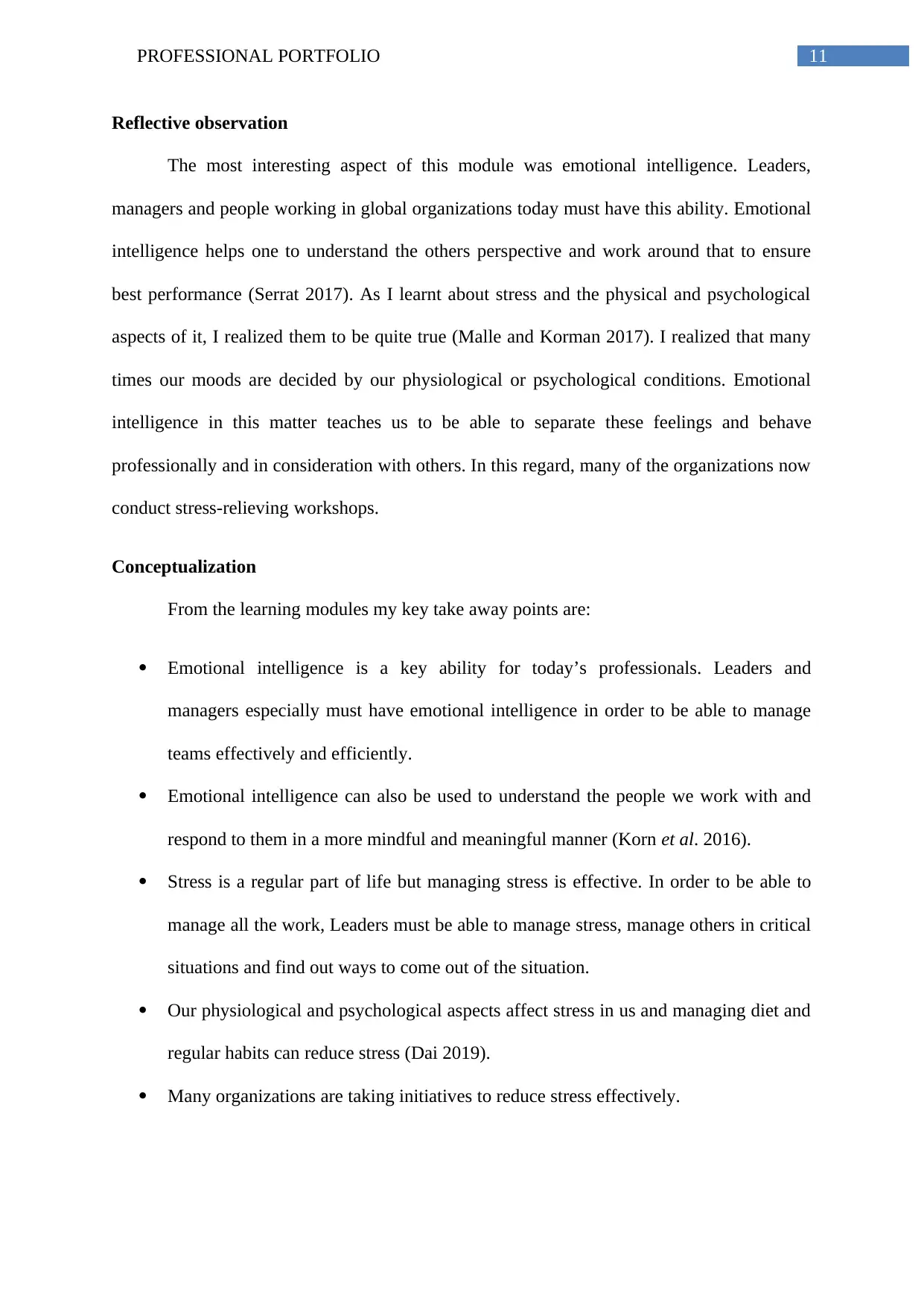
11PROFESSIONAL PORTFOLIO
Reflective observation
The most interesting aspect of this module was emotional intelligence. Leaders,
managers and people working in global organizations today must have this ability. Emotional
intelligence helps one to understand the others perspective and work around that to ensure
best performance (Serrat 2017). As I learnt about stress and the physical and psychological
aspects of it, I realized them to be quite true (Malle and Korman 2017). I realized that many
times our moods are decided by our physiological or psychological conditions. Emotional
intelligence in this matter teaches us to be able to separate these feelings and behave
professionally and in consideration with others. In this regard, many of the organizations now
conduct stress-relieving workshops.
Conceptualization
From the learning modules my key take away points are:
Emotional intelligence is a key ability for today’s professionals. Leaders and
managers especially must have emotional intelligence in order to be able to manage
teams effectively and efficiently.
Emotional intelligence can also be used to understand the people we work with and
respond to them in a more mindful and meaningful manner (Korn et al. 2016).
Stress is a regular part of life but managing stress is effective. In order to be able to
manage all the work, Leaders must be able to manage stress, manage others in critical
situations and find out ways to come out of the situation.
Our physiological and psychological aspects affect stress in us and managing diet and
regular habits can reduce stress (Dai 2019).
Many organizations are taking initiatives to reduce stress effectively.
Reflective observation
The most interesting aspect of this module was emotional intelligence. Leaders,
managers and people working in global organizations today must have this ability. Emotional
intelligence helps one to understand the others perspective and work around that to ensure
best performance (Serrat 2017). As I learnt about stress and the physical and psychological
aspects of it, I realized them to be quite true (Malle and Korman 2017). I realized that many
times our moods are decided by our physiological or psychological conditions. Emotional
intelligence in this matter teaches us to be able to separate these feelings and behave
professionally and in consideration with others. In this regard, many of the organizations now
conduct stress-relieving workshops.
Conceptualization
From the learning modules my key take away points are:
Emotional intelligence is a key ability for today’s professionals. Leaders and
managers especially must have emotional intelligence in order to be able to manage
teams effectively and efficiently.
Emotional intelligence can also be used to understand the people we work with and
respond to them in a more mindful and meaningful manner (Korn et al. 2016).
Stress is a regular part of life but managing stress is effective. In order to be able to
manage all the work, Leaders must be able to manage stress, manage others in critical
situations and find out ways to come out of the situation.
Our physiological and psychological aspects affect stress in us and managing diet and
regular habits can reduce stress (Dai 2019).
Many organizations are taking initiatives to reduce stress effectively.
⊘ This is a preview!⊘
Do you want full access?
Subscribe today to unlock all pages.

Trusted by 1+ million students worldwide
1 out of 21
Related Documents
Your All-in-One AI-Powered Toolkit for Academic Success.
+13062052269
info@desklib.com
Available 24*7 on WhatsApp / Email
![[object Object]](/_next/static/media/star-bottom.7253800d.svg)
Unlock your academic potential
Copyright © 2020–2026 A2Z Services. All Rights Reserved. Developed and managed by ZUCOL.





